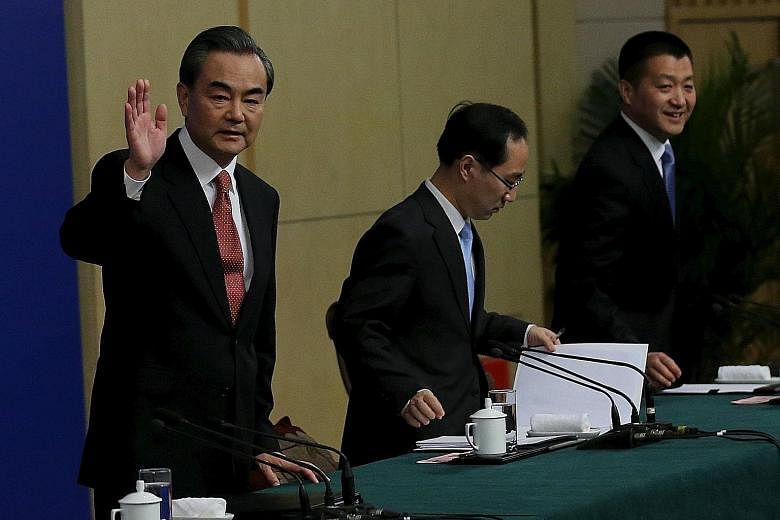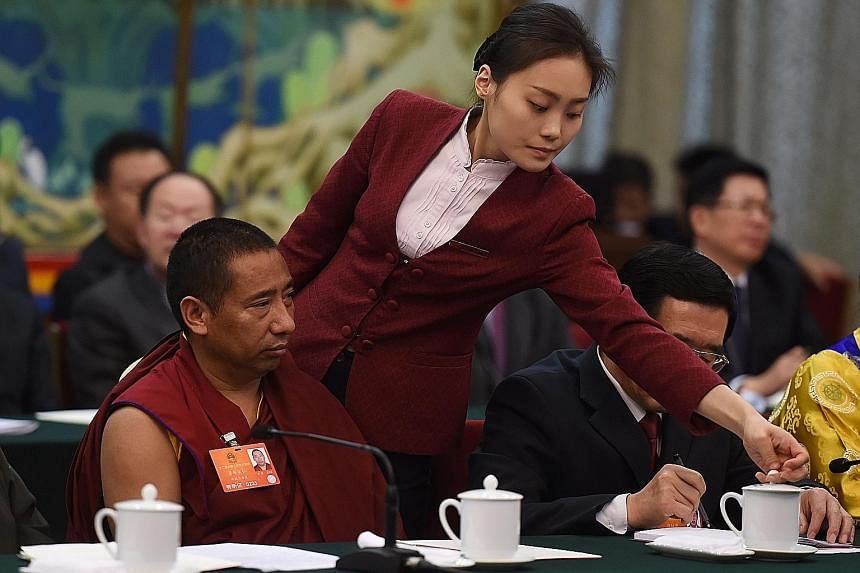China has proposed setting up a cooperation mechanism for coastal states in the South China Sea, as part of efforts to improve maritime collaboration with South-east Asia.
But with tensions still high in the contested waters, its Foreign Minister Wang Yi staunchly defended China's building of defence facilities, while accusing other countries of militarising the region.
Speaking at a press conference yesterday on the sidelines of China's annual legislative meeting, Mr Wang said Beijing was "willing to explore the possibility of establishing a South China Sea littoral states cooperation mechanism" when he addressed the China-Asean relationship, which celebrates its 25th anniversary this year.
While he gave no details, analysts said this is the first time a Chinese official has mooted such a mechanism. Asean's eight South China Sea littoral states include Vietnam, Malaysia, Brunei and the Philippines, which have competing territorial claims with China that have soured bilateral ties. Littoral states with no claims are Cambodia, Singapore, Indonesia and Thailand.
"China is looking to cool the tensions with claimant states, which are the main source of tensions with Asean," said Beijing-based South-east Asia expert Xu Liping.
He said a cooperation mechanism could be similar to deals China has signed with individual Asean states, such as on maritime research, development and security. These did not supersede China's dealings with Asean, he noted.
Security expert Li Mingjiang of the S. Rajaratnam School of International Studies feels the mechanism would likely focus on "softer" matters like environmental protection. "On matters of security, China still prefers to work with Asean because having all the countries involved would help moderate some of the extreme views that may be favoured by claimant states," he said.
Mr Wang yesterday continued to dismiss the Philippines' South China Sea arbitration case against China in The Hague, saying it was the result of "instigation and political manipulation".
Ties with other Asean states have also been strained since China's reclamation activities in the South China Sea began in 2014, and recent reports that it had deployed missiles, fighter jets and radar equipment on disputed islands and reefs there.
The Diplomat website on Monday published new satellite images that showed reclamation works around North Island in the disputed Paracels, saying the new land could be large enough for a runway.
Tensions have also risen between China and the United States, which has accused Beijing of militarising the region and carried out freedom of navigation exercises close to islands claimed by China. In a veiled swipe at the US yesterday, Mr Wang said there are parties now "that stir up trouble and show off their firepower" in the South China Sea. "But like the tides that come and go, these plots will come to nothing," he said. "History will prove who is the visitor and who is the genuine host."
He added that China was "not the first country to deploy weapons, not the one which deployed the most weapons, not the one that conducts the most military activities".
"Everyone is talking about militarisation. This label is more suitable for other countries," Mr Wang said, adding that "when the US cools down" it will be possible to consider maritime cooperation.
In the wide-ranging briefing that lasted two hours, Mr Wang also said China's "One Belt, One Road" initiative has garnered interest from over 70 countries and international groups, with 30 signing deals with China. The regional infrastructure and economic development strategy was unveiled in 2013.
But Mr Wang sounded a more sombre tone on Sino-Japanese ties, saying there was little ground for optimism despite signs of improvement. He accused Japanese politicians of "double dealing" - saying nice things while making trouble. "Does Japan view China as friend or foe? Partner or adversary? It should think seriously about this."


